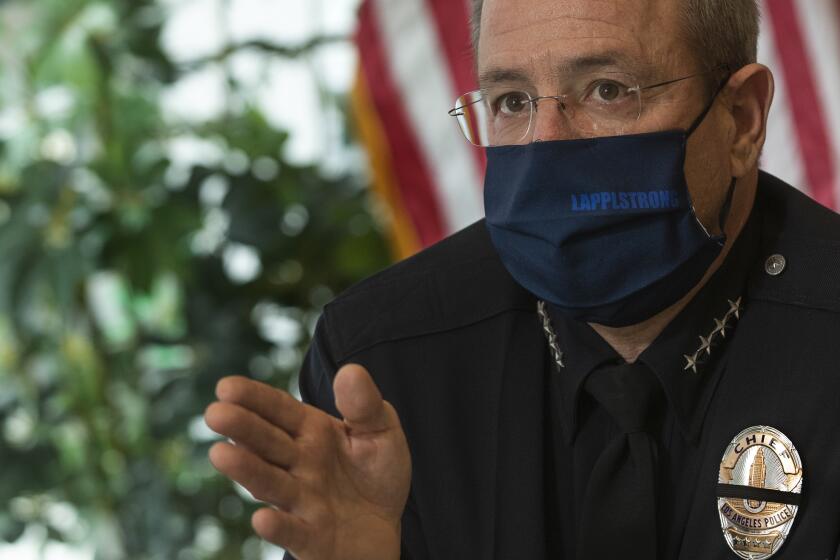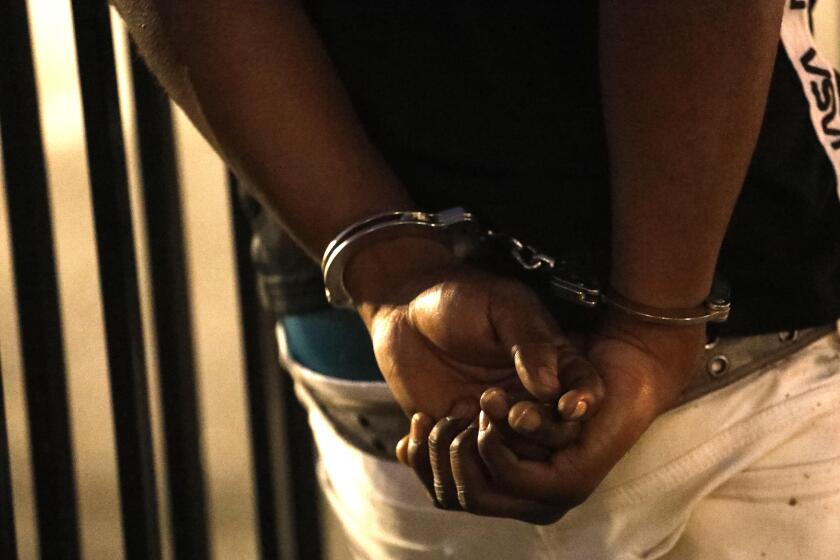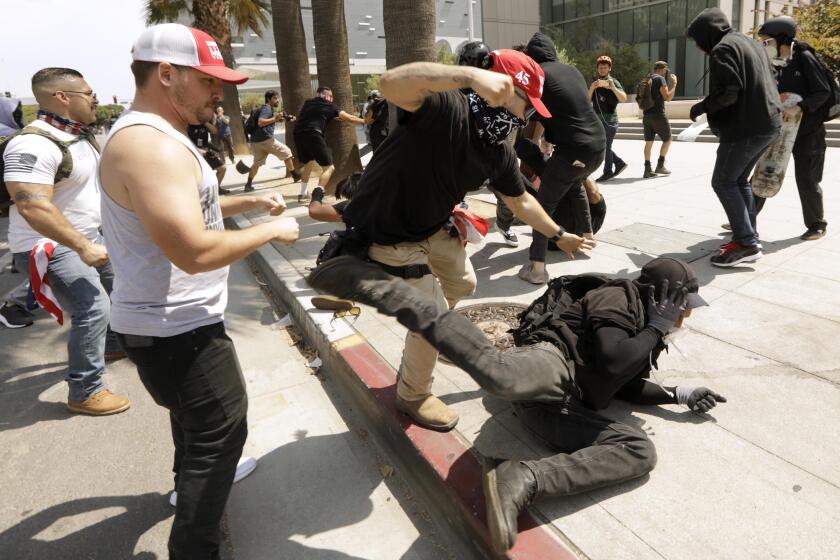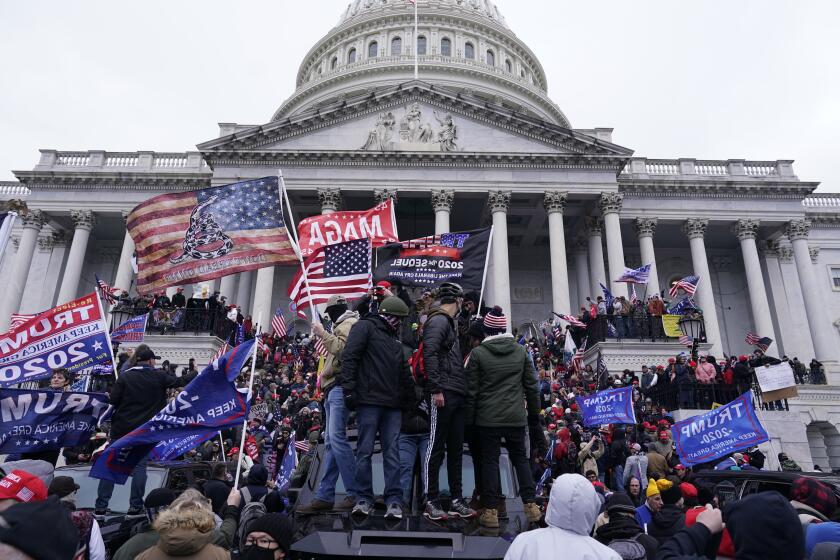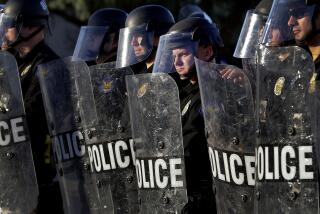Bias, far-right sympathies among California law enforcement going unchecked, audit finds
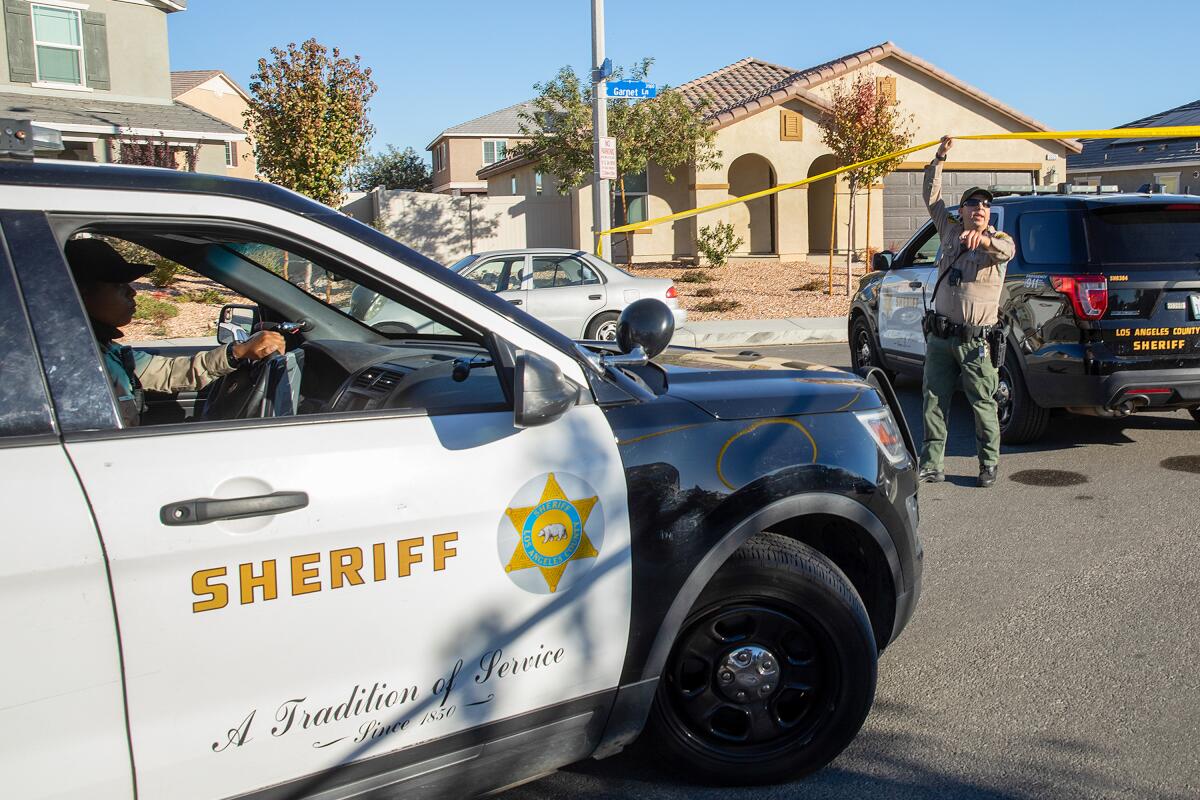
- Share via
A state audit of five law enforcement agencies in California found bias among officers toward people of color, immigrants, women and LGBTQ people, as well as a smattering of support for far-right extremist organizations such as the Proud Boys and Three Percenters.
The audit also found the agencies had insufficient policies in place to safeguard against such attitudes within their ranks, to investigate them when they are alleged or to address them once identified, according to a report issued by the state auditor’s office this week.
“As a result, these departments are at a higher risk of being unaware of and unable to effectively address the ways in which their officers exhibit bias,” the audit found.
The audit was conducted at the request of state lawmakers. It comes amid rising concerns nationally about far-right extremism among police and other law enforcement officers, as well as evidence that bias complaints against California officers are overwhelmingly dismissed after internal investigations.
On the national level, attention to the problem increased after it was revealed that police officers were among those involved in the Jan. 6, 2021, attack on the U.S. Capitol. In California, a recent Times investigation found that police agencies across the state upheld just 49 racial profiling complaints from 2016 to 2019, or less than 2% of the roughly 3,500 allegations filed.
After the Capitol siege, law enforcement leaders have been forced to confront extremism in their own ranks.
The Los Angeles Police Department has been accused of showing sympathy to far-right protesters at demonstrations in L.A., and L.A. County Sheriff Alex Villanueva recently said 80% of his workforce was “conservative and far right.”
The new audit, requested by the Joint Legislative Audit Committee, assessed bias within the Los Angeles County Sheriff’s Department, the California Department of Corrections and Rehabilitation, and the San Bernardino, San José and Stockton police departments.
The report does not say how those agencies were chosen, and officials in the state auditor’s office would not provide that information — other than to say that auditors sought to include agencies from a variety of jurisdictions and geographic locations across the state.
The auditors reviewed five internal investigations from each of the five departments, including cases in which members of the public initiated bias complaints, and sought to review social media posts of 750 individual officers, the report said.
From 2016 to 2019, California law enforcement agencies rejected more than 98% of the racial profiling complaints they received. The internal review process has little transparency for those filing claims.
Although many officers’ social media accounts were never found and others were private, the auditors nonetheless found that at least 17 officers had posted “biased statements or content” online, including posts that “either promoted negative stereotypes or contained deliberately hateful and derogatory speech directed at groups of people.”
The auditors noted that the biased posts and comments they identified were “generated by a small number of the officers at each department,” but they said that “concluding on that basis alone that bias is not a significant problem at these departments would be incorrect.”
“By its nature, our review was not designed to catalogue every instance of biased conduct or statements by officers at these departments. Our work encompassed only a limited number of internal investigations and the publicly shared views of a selection of officers,” they wrote. “Moreover, the behavior of even a few officers can erode a community’s trust in law enforcement and damage the relationship between a department and the community it serves.”
In an interview with The Times, acting California State Auditor Michael Tilden said the examples of bias that were found were enough to indicate larger problems and a need for immediate interventions.
Protests around some of the nation’s most fraught political issues are devolving into street fights in L.A., and police have struggled to respond.
“We found enough of it — and it was spread out across all five departments — that to us it was evidence that there are improvements that have to be made,” he said. “There was enough here to suggest that departments need to do a better job to guard against biased conduct on the part of their officers.”
The auditors said officers in all five agencies were found to have expressed bias and outlined several examples.
At a corrections department facility, auditors found that an officer teased a Black incarcerated youth about liking watermelon and chicken, and teased another incarcerated youth about their clothing, saying, “You look like a girl,” and asking, “Are you gay?”
Why so many military veterans and former and current police officers support — and take part in — far-right groups and protests, including the Jan. 6 Capitol riot.
That officer received an unpaid suspension.
When two San José Police Department officers were called to a dispute between a landlord and tenant, auditors found that they made derogatory comments about the Vietnamese landlord before arriving.
“I would say she’s about 5 foot 4 inches, very skinny, bad teeth, very heavy accent,” one officer said.
The officers then denied a request from the landlord for a translator, demanded that she pay the tenant a cash deposit, threatened to take her to jail if she didn’t, joked about her not having any money and having a gambling addiction, and placed her in the back of a patrol car until another neighbor paid the cash.
After the department determined racial bias played a factor in the case, one of the officers received a 40-hour suspension without pay. The other was not punished.
In San Bernardino, two officers were found to have used excessive force against a Latina who was involved in a car accident and who they handcuffed — hitting her face against a pole in the process — after a family member indicated that she did not want to provide identification.
The officers never called for a translator even though it was unclear to them whether the woman understood what they were saying to her, and “appeared frustrated with the woman for little reason,” auditors found.
The San Bernardino Police Department ruled there was excessive force used in the case but “did not consider if bias had affected the way these officers handled the situation,” the auditors found.
The auditors also included in their report examples of biased social media posts by officers, without identifying which agencies they were employed by. The auditors hired a social media research firm to help identify officers’ public accounts.
One officer posted an image of a transgender woman and a high-capacity rifle with the words, “If this is a woman, this is a fishing pole.” Another posted a picture of the World Trade Center burning on Sept. 11, 2001, with the caption, “Every time a Muslim stand up [sic] in Congress and tells us they are going to change the constitution, impeach our president, or vote for socialism, remember you swore you would never forget. They swore they would destroy us from within.”
The auditors said they found no evidence of law enforcement officers being formal members of extremist organizations but did find at least six officers who expressed support for such groups.
One officer posted a statement defending the Proud Boys — a group of self-described “Western chauvinists” who share racist, misogynistic and xenophobic ideologies and who participated in the siege on the U.S. Capitol — by writing that anyone who was against the group was “in reality just against masculinity.”
Two officers shared content associated with the Three Percenters, another far-right group regarded by civil rights organizations as a paramilitary, antigovernment organization known for violent rhetoric, whose members also participated in the Capitol siege.
“Given the public statements and activities of these groups, these officers’ promotion or support of these groups on social media calls into question their ability to treat individuals fairly in the exercise of their duties,” the auditors found.
None of the officers were identified in the report.
Beyond the troubling statements of individual officers, the auditors found that none of the agencies had adequate systems in place for “proactively identifying” biases, and that none adequately investigated allegations of biased conduct.
“Many investigations were narrowly focused on blatant signs of bias, relied heavily on officers’ denials, or did not account for how officers’ conduct reasonably appeared,” the audit found. “Each department needs a better framework for consistently identifying, investigating and tracking incidents of bias.”
The auditors recommended the agencies better vet for bias among officers, better track and identify instances of bias, establish earlier interventions for officers who show bias, and formalize and improve investigative and discipline measures for dealing with bias when it crops up.
They also recommended that the L.A. County Sheriff’s Department and corrections department finish equipping officers with body cameras by April 2023, and that state officials begin providing more oversight of bias issues within law enforcement.
In its response to the audit, the corrections department said it recognizes “the importance of creating an environment that acknowledges the value of cultural awareness, while also reducing bias and eliminating any potential affiliations with hate groups,” and that it is working to ensure proper screening for bias among potential hires and bias training for existing officers.
It said installing more cameras in facilities and providing staff with body cameras at more facilities was an issue of funding, and that it is seeking millions of dollars in additional funds to increase the number of cameras it uses.
The L.A. County Sheriff’s Department said it largely concurred with the recommendations of the auditors, many of which it has already implemented — a claim auditors challenged.
The Sheriff’s Department said some of the proposed changes, particularly those relating to officer discipline, would be subject to collective bargaining with labor unions. It also said that, although it is in the midst of a pilot program to assess the “efficacy and feasibility” of body cameras for deputies, it would decide whether to equip its entire workforce with such cameras only after that pilot concludes — a position auditors also challenged.
“The lack of body-worn camera footage at Los Angeles Sheriff likely limited our ability to identify biased conduct, and expanding the use of body-worn cameras in custody settings would improve Los Angeles Sheriff’s ability to effectively investigate allegations of officer misconduct,” the auditors wrote.
The San José Police Department largely accepted the recommendations of the audit and said it was working to address — or had already addressed — the noted shortcomings in how it handled bias. The Stockton Police Department said it would be reviewing the recommendations and implementing needed changes. The San Bernardino Police Department did not submit a formal response to the audit’s findings.
More to Read
Sign up for Essential California
The most important California stories and recommendations in your inbox every morning.
You may occasionally receive promotional content from the Los Angeles Times.
